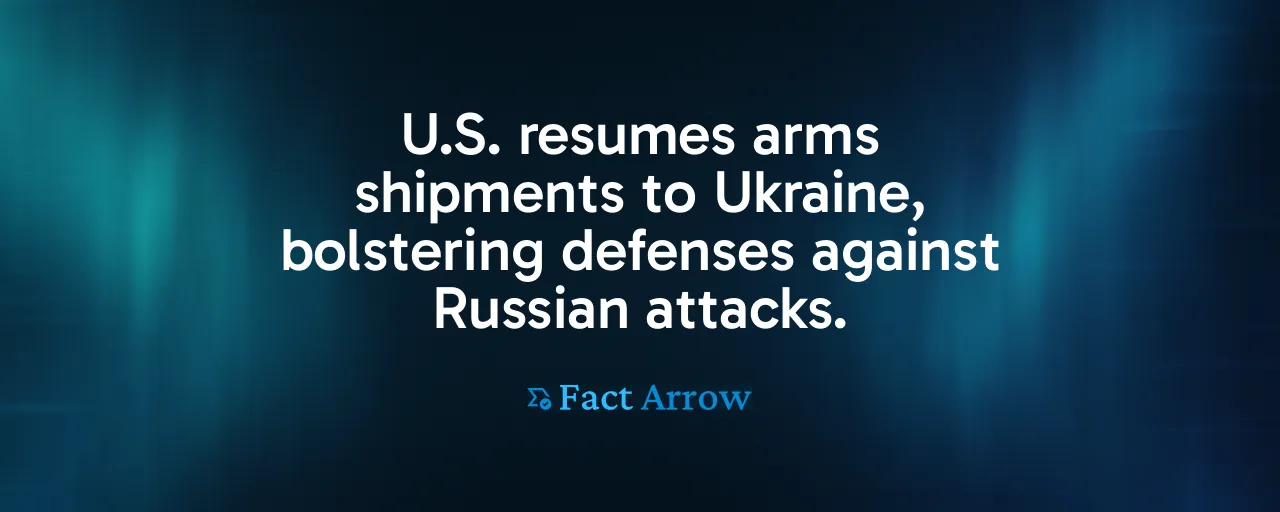A Renewed Commitment to Ukraine
On July 7, 2025, the Department of Defense announced a resumption of defensive weapons shipments to Ukraine, responding to intensified Russian missile and drone attacks on Ukrainian cities. This decision, directed by President Trump, reverses a week-long pause prompted by concerns over U.S. munitions stockpiles. This decision highlights the critical importance of reaffirming support for Ukraine's sovereignty and the broader fight for democratic values.
The pause, though brief, sent ripples of concern through Kyiv and NATO capitals. Ukrainian forces, reliant on U.S.-supplied Patriot interceptors and artillery shells, faced mounting pressure as Russian assaults targeted civilian infrastructure. The resumption of aid, including air-defense systems and rockets, offers immediate relief while also reigniting a broader conversation about America's role in defending democracy without compromising its own security.
This announcement arrives against a backdrop of global scrutiny. NATO allies, particularly Poland and the Baltic states, have urged consistent Western support as they increase their own defense budgets. Ukrainian President Volodymyr Zelensky has emphasized that delays in aid directly correlate with higher civilian casualties. Sustained support is a tactical necessity and a moral imperative.
Why Support Matters Now
Ukraine's defense hinges on a steady flow of advanced systems like Patriot interceptors and NASAMS, which have proven effective against Russian missiles. Battlefield data shows that when interceptor stocks dwindle, Ukrainian shoot-down rates plummet, leaving cities vulnerable. Since 2022, the U.S. has delivered over $66 billion in security aid, including 3 million artillery shells and thousands of missiles, making it Ukraine's largest backer.
Critics of pauses argue they embolden Russian aggression. Each delay allows Moscow to exploit gaps in Ukraine's air defenses, escalating civilian suffering. A 2025 RAND study underscores that consistent interceptor supplies directly reduce casualties by enabling Ukraine to protect urban centers. This evidence highlights the importance of unwavering commitment for those prioritizing human rights and international law.
Beyond the battlefield, support for Ukraine reinforces a global order rooted in sovereignty and self-determination. The Biden administration's 2024 supplemental bill, which funded increased artillery production, shows America can balance aid with domestic needs. By fall 2025, U.S. factories are set to produce 60,000 shells monthly, proving industrial capacity exists to meet both Kyiv's demands and U.S. readiness goals.
A Legacy of Standing Firm
America's support for Ukraine echoes its historical role in defending democratic ideals. Since Russia's 2014 annexation of Crimea, the U.S. has provided escalating aid, from non-lethal gear to advanced weaponry after the 2022 invasion. This commitment mirrors post-World War II efforts to rebuild Europe and counter authoritarianism, when principled leadership shaped a stable world.
Pauses, like those in February and May 2025, risk repeating past mistakes. Pre-World War II isolationism weakened collective security, allowing aggression to spread unchecked. Today, advocates for robust aid argue that supporting Ukraine deters future threats from authoritarian regimes, whether in Europe or the Indo-Pacific. A 2025 CSIS report confirms that sustained aid strengthens NATO's credibility, ensuring allies remain united against coercion.
Strengthening the Homefront
Concerns about U.S. stockpiles are valid but addressable. Congressional briefings reveal that paused July munitions accounted for less than 1 percent of strategic reserves, a manageable fraction. The Defense Production Act offers tools to accelerate output, as seen with 2024 orders boosting Patriot interceptor production. By prioritizing multiyear contracts, policymakers can ensure factories like those of Raytheon and Lockheed Martin meet global demand.
Economic benefits also emerge. Increased defense spending creates jobs in American factories, from guidance electronics to rocket motors. A Congressional Budget Office estimate projects that replacing transferred munitions will cost $18-22 billion through 2028, but foreign military sales to NATO allies offset costs. This dual-use strategy strengthens both Ukraine and the U.S. economy.
A Call for Global Partnership
Ukraine's fight is not America's alone. NATO's June 2025 summit saw allies pledge 5 percent of GDP to defense, a historic step toward burden-sharing. European nations, especially Germany and Poland, are ramping up their own aid, with the EU covering 33 percent of global support by mid-2025, up from 23 percent in 2023. A proposed NATO Patriot Pool, where allies rotate batteries to Ukraine, could further distribute responsibilities.
To fund this effort, creative financing is key. Windfall taxes on excess oil profits, as proposed in 2024, could generate billions for aid without straining U.S. taxpayers. Pairing military support with humanitarian and reconstruction funds ensures Ukraine survives and rebuilds as a democratic beacon.
Looking Ahead With Resolve
The decision to resume arms shipments marks a pivotal moment. It reaffirms America's commitment to Ukraine while signaling to adversaries that democratic alliances remain unbroken. Consistency is critical. Intermittent pauses disrupt planning for Kyiv and defense contractors, undermining trust. A transparent stockpile health index, as suggested by analysts, could balance readiness with aid, ensuring predictability.
This fight transcends borders. Supporting Ukraine upholds the principle that no nation should face annihilation for choosing its own path. It also sends a message to aggressors worldwide: violations of sovereignty will meet unified resistance. American leadership, paired with allied cooperation, can sustain this effort without sacrificing domestic priorities.
As Ukraine endures relentless attacks, the world watches. Will the U.S. and its partners stay the course, proving that democracy is worth defending? The answer lies in actions, rather than words, and in a commitment to a future where freedom prevails.
